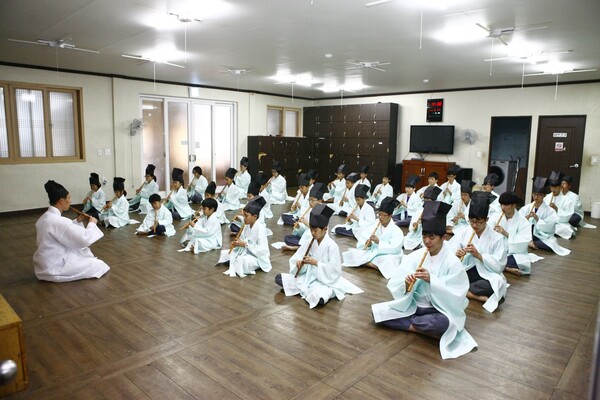
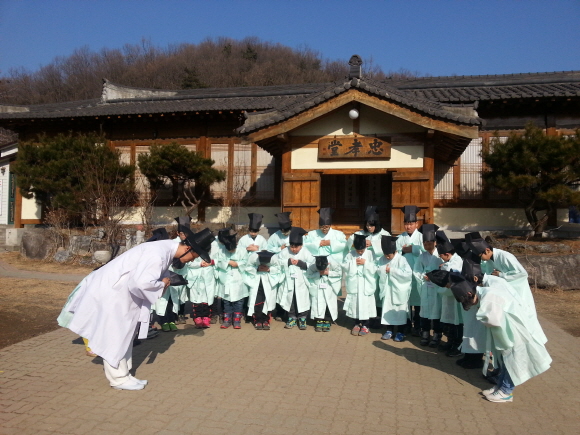
충남 논산시 연산면 송정리 범골에 대를 이어 한학(漢學)의 맥을 이은, 의정 유복엽 훈장이 설립한 양지서당이 있다.
양지서당은 이곳으로 유학을 와서 학교에 다니며, 서당교육을 받는 기관이다. 우리나라 전통교육기관으로 바른 인성을 함양, 건강한 신체 단련 등을 통해 건전하고 바른 성품과 품격을 갖춘 인재로 길러내는 게 목적이다.
양지서당은 힘겹게 맥을 이어오다 2002년 교육기관으로 첫 개원을 하고 현재까지 20년의 세월을 거쳐 지금의 서당 면모를 갖추게 되었다.
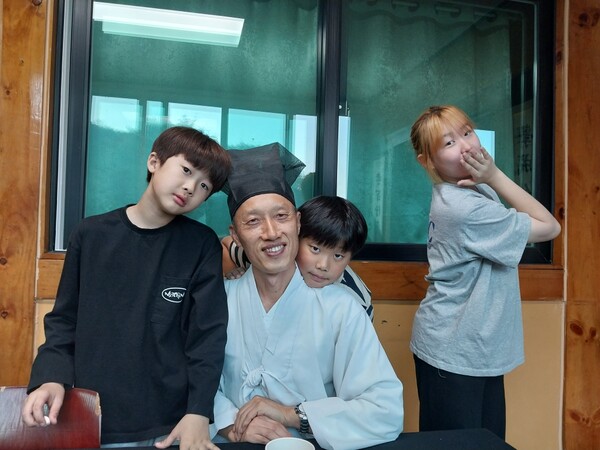
이 길을 걸어온 현재 양지서당의 유정우 훈장은 “서당은 옛날, 일종의 사립 교육기관이다. 일반적으로 초등, 중등 교육을 담당하는 교육기관이라고 알고 있는데, 꼭 그랬던 것만은 아니다. 서당은 보통, 가문이라 불리는 곳에서 운영하는 종관 서당이었다. 논산 노성에 가면 종학당이 있다. 그곳이 종관 서당이다. 이렇게 가문에서 운영하던 서당을 신분 계층의 문턱을 낮춰 마을 학생들이 올 수 있게 변모한 것이다. 관에서 운영하는 학교는 즉, 국립학교는 향교라 한다.”라며 서당의 의미를 알려주었다.
또 그는 “서당이 개화기를 거쳐 일제 강점기의 고난을 겪으며 명맥이 유실되고 많이 사라졌다고 생각하는 사람들이 있다. 하지만 서당은 외려 일제강점기 때 분포도가 높았다는 연구 결과가 있다. 독립운동을 하는 가장 밑바탕이 되는 뿌리로 우리 문화 지키기 목적으로 많은 서당이 일제 강점기 때 설립되었다. 즉, 우리 민족을 지키는 교육기관이었다. 그런 일종의 문화 운동이 항일 운동과 비슷한 맥락을 띠어 일본의 민족 말살 정책에 의한 수난을 당했다.”라며 사당의 애석한 역사에 대해 씁쓸하게 말을 이었다.
“현재 대한민국에 사단법인 한국전통서당문화진흥회라는 법회에 소속된 서당 훈장은 20여 명 남짓이다. 이름만 서당이 아니고 또 학원식으로 운영하는 분들 말고 전통을 지키며 또, 저희처럼 선업(先業)을 이어오신 분들이다.”라며 선업을 지키는 마음을 보였다.
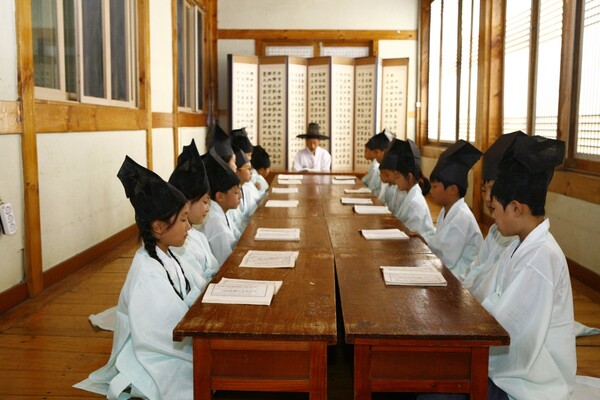
한국 전통적인 교육은 시대와 역사의 흐름에 따라 당연히 퇴색되고 빛이 바랠 수밖에 없었다. 하지만 양지 서당 유정우 훈장은 오히려 이 시대의 서당교육이 21세기에 꼭 필요한 교육이 될 수 있음을 자부했다.
또 그는 “서당에서 배우는 학문은 한학을 중점으로 두기에 어렵다고 느껴지는 것이 분명하다. 하나, 그 교육 과정 속에서 우리는 아이들에게 가장 근본이자 기본이 되는 철학을 가르친다. 첫 번째로 어렸을 때 배워야 하는 가장 기초적인 행실에 대한 것을 가르치고, 이어 사서삼경으로 자기 정신과 심신을 깨우는 교육을 한다.”라며 서당 교육 철학의 포문을 열며 “건전하고 건강한 사회를 이루며 지속하기 위해서는 관계가 가장 중요하다. 그 핵심의 기본은 부모와 자식의 관계이다. 즉, 나와 나의 부모, 그 만남에서부터의 시작은 한 사람 일생의 모든 근본을 결정짓는 것이다. 내가 탄생하는 것이 시작이니 첫 번째로 부모를 가장 존중해야 하며 효를 실천해야 한다. 그다음으로는 형제, 세 번째가 친교, 즉 교우 관계이다.”라며 양지서당 교육 실천에 대한 목적의의를 설파했다.
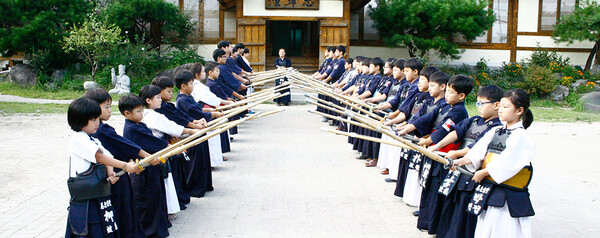
‘요즘은 영어를 더 선호하는데 한학은 생소하고 힘들어 아이들이 어려워하지 않을까?’란 질문에 유정우 훈장은 “처음에는 다들 어려워했다. 하지만 계속 접하고 깨닫고 또 재미를 느끼며 스스로에 대해 알아가는 학생들이 많았다. 이런 교육이 어쩌면 미래를 이끌어갈 참 인재를 만드는 교육일지도 모른다. 우리 교육의 기능적인 부분은 땅과 비교를 한다. 땅의 토질이 좋으면 어떤 식물을 심어도 잘 자란다. 또, 단단한 땅에 건물이나 집을 지을 수 있는 것처럼 서당 교육은 그런 것에 중점을 둔 교육이기에 현대 사회에서 사라져가고, 잊혀가는 ‘인의예지’에 뜻을 바로 새길 수 있다.”라며 답했다.
이어 그는 “동몽선습의 인의예지에서 인이 첫 번째로 나온다. 가장 중요하단 뜻이다. 인은 사랑을 말한다. 즉, 자비이다. 사람들과 친밀한 관계성을 형성하며 배려를 통해 좋은 공동체를 이끄는 유연함과 강직함을 말하는 것이다.”라며 말했다.
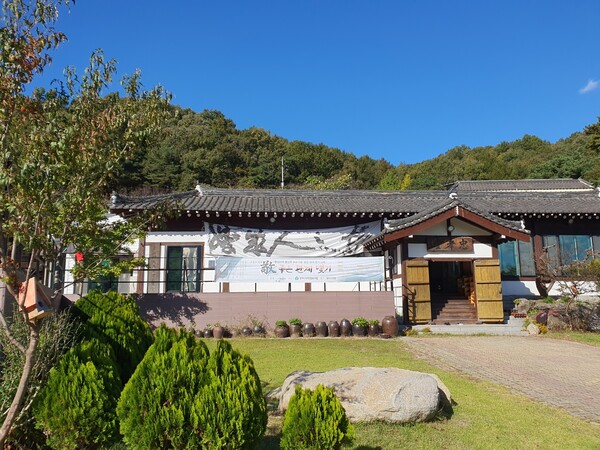
최근 논산에 위치한 한국유교문화진흥원에서 ‘K-유교 세계화’를 위한 포석을 선포했다. K팝, K영화, K드라마, K게임처럼 한국 고유한 유교 문화를 한류 주요 콘텐츠 중 하나로 이끌자는 내용이 있다.
이에 유정우 훈장은 “그 핵심 거점으로서의 협업도 했었다. 그러나 주는 아니었다. 하지만 서당은 그 유교 문화의 핵심 역할을 충분히 할 수 있다고 본다. 예전에 하얼빈 대학 한 교수님이 저와 얘기하다 깜짝 놀랐다. 그는 다짜고짜 한국은 대단하다며 어떻게 하면 화폐에 국가의 주석 또는 왕이 아닌 학자인 훈장을 넣었느냐며 물었었다. 천 원짜리에 새긴 ‘퇴계 이황 선생’과 ‘도산서당’을 말하는 것이다”며 서당 문화를 넌지시 자랑했다.
“2006년 문체부에서 선정한 한국 민족의 상징 백선 중 교육 분야에 딱 두 가지가 선정되었다. 하나는 서당이고 하나는 한석봉과 어머니이다. 즉, 자식 교육을 위해 헌신하시는 어머니상은 그 어디에도 없는 한국의 독특한 문화라 생각한다. 그것이 우리나라 전반에 깊이 각인된 문화이다. 한국 어머니들의 교육열은 세계 제일이다.”라며 담소도 건넸다.
그리고 그는 “지금 이 시대는 인성이 가장 중요한 시대이다. 사람이 사람 된 도리를 잊고 살아갈수록 사회와 공동체는 붕괴할 수밖에 없다. 산업화를 거치며 고리타분하고 쓸모없는 교육기관으로 전락해 버린 서당이었지만 미래에 꼭 필요한 필수 교육으로 자리 잡아 미래를 위한 인재 교육기관으로 발전하기를 바란다.”라며 미래 교육의 발전을 희망했다.
유교 배움의 유익함을 전하는 유정우 훈장은 “유교의 근본은 사랑이다. 그 인(仁)을 모티브로 의(義)가 지켜지는 것이다. 이것을 두루 바르게 쓰임을 배우는 곳이다. 칼의 쓰임에 따라 이기(利器)가 되고 흉기가 되는 것처럼, 사람도 유교를 배우고 익힘으로 성숙한 사람이 되어 사회에 유익한 영향을 끼치게 된다. 이것을 위해 노력을 한다. 서당에서 유복(儒服)을 입는 체험은 색다른 재미를 준다. 검도를 가르치고 농사도 짓는다. 아이들은 색다름에 빠져들고 또 동화도 한다. 앞으로 서당 문화가 한국에 넘치고 또 세계로 확대되기를 소망한다.”라며 교육의 중요성을 다시금 되새기게 하였다.
'Yangji Seodang' was founded by Hunjang Yoo Bok-yup, a village school teacher (in the traditional Korean society), who passed down the lineage of Chinese classics in Songjeong-ri Bumgol, Yeonsan-myeon, Nonsan-si, Chungcheongnam-do.
Yangji Seodang is an institution where students come to study abroad and attend school and receive Seodang education. It is a traditional Korean educational institution that aims to cultivate people with sound character and dignity through cultivating good character and healthy physical training.
Yangji Seodang was first opened as an educational institution in 2002 after struggling to survive, and it has been 20 years since then.
Yoo Jung-woo, the current director of Yangji School, explains, "In the old days, a school was a kind of private educational institution. We usually think of it as an institution for primary and secondary education, but it wasn't always like that. It was usually a 'Jongguan' school run by a so-called family. If you go to Nonsan Noseong, there is a 'Jonghakdang'. That's the 'Jonggwan Seodang'. These schools were transformed by lowering the threshold of class to allow students from the village to attend. He explained the meaning of 'Seodang' by saying, "A school run by the government is called 'Hyanggyo', and a national school is called 'Hyanggyo'.
He added, "Some people think that 'Seodang' lost its reputation and disappeared during the hardships of the Japanese occupation. However, there are studies that show that 'Seodang' was highly distributed during the Japanese occupation. Many Seodangs were established during the Japanese occupation for the purpose of protecting our culture as the most fundamental root of the independence movement. In other words, they were educational institutions to protect our nation. This kind of cultural movement was similar to the anti-Japanese movement and suffered from Japan's policy of ethnic extermination," he said bitterly about the shrine's sad history.
"Currently, there are more than 20 'Seodang' masters in Korea who belong to a legal organization called the Korea Traditional Seodang Culture Promotion Association. They are not only those who are not called Seodang in name, but also those who operate in a school style, but also those who have kept the tradition and continued the good work like us," he said.
Traditional Korean education was bound to fade and lose its luster with the passage of time and history. However, Yoo Jung-woo, the head of Yangji Seodang, is proud that Seodang education in this era can be a necessary education in the 21st century.
He said, "It is obvious that the studies taught at the school are difficult because they are centered on Chinese studies. However, in the process, we teach children the most fundamental and basic philosophy. First, we teach them about the most basic behaviors they should learn as children, and then we teach them to awaken their minds, hearts, and bodies through the Three Books of Sages." He concluded the philosophy of education at Seodang by saying, "Relationships are the most important to build and sustain a sound and healthy society. In other words, the relationship between me and my parents, starting from the meeting, determines all the fundamentals of a person's life. Since your birth is the beginning, you must first honor your parents the most and practice filial piety. The second is the brother, and the third is communion, or friendship," he said, explaining the purposefulness of his educational practice.
In response to the question, "Don't you think children will find it difficult to learn Korean because it's unfamiliar and difficult?", Yoo Jung-woo said, "At first, everyone found it difficult. However, there were many students who continued to learn, realize, have fun, and learn about themselves. This kind of education may be the education that creates true talents to lead the future. The functional part of our education is compared to land. If the soil of the land is good, any plant can grow well, and just as a building or house can be built on solid ground, Seodang education focuses on such things, so it can immediately imprint the meaning of 'benevolence, righteousness, propriety and wisdom,' which are disappearing and being forgotten in modern society."
"In Dong Mong Seon Seup's 'benevolence, righteousness, propriety and wisdom,' benevolence comes first. It means the most important thing. benevolence is love, which is mercy. It's about the flexibility and rigor of forming close relationships with people and leading a good community through caring."
Recently, the Korea Confucian Cultural Center in Nonsan declared that it is preparing for the future of "K-Confucian Globalization. The idea is to make Korea's unique Confucian culture one of the main contents of the Korean Wave, like K-pop, K-movies, K-dramas, and K-games.
In response, Yoo Jung-woo said, "We used to collaborate as a core base. But not the state. But I think the Seodang can play a key role in that Confucian culture. A professor from Harbin University once surprised me when he was talking to me, and he said that Korea is great, and he asked me how they put a scholar on the currency instead of a president or king. "I'm talking about the 1,000-won coins with 'Dr. Cheekgye Yi Hwang' and 'Dosan Seodang' on them," he said, bragging about the Seodang culture.
"In 2006, the Ministry of Culture, Sports, and Tourism selected one hundred symbols of the Korean nation, and only two were selected for education. One is Seodang, and the other is Han Seokbong and mothers. In other words, the image of a mother devoting herself to the education of her children is a unique Korean culture that is not found anywhere else. It is a culture that is deeply imprinted on the entire nation. Korean mothers are the most educated in the world," he said.
And he said, "This is an era where character is the most important thing. The more people forget how to be human, the more society and community will collapse. I hope that Seodang, which has become an outdated and useless educational institution through industrialization, will be established as an essential education for the future and develop into a talent education institution for the future." He expressed his hope for the development of future education.
Conveying the benefits of learning Confucianism, Medalist Yoo Jung-woo said, "The foundation of Confucianism is love. Under the motif of 'Benevolence' (仁), 'Righteousness'(義) is observed. The place to learn the proper use of this is the Seodang. Just as a sword becomes a benefactor and a weapon according to its use, a person can become a mature person by learning and mastering Confucianism and have a beneficial impact on society. We strive for this. The experience of wearing Confucian robes in the hall is a unique one. We teach kendo and do farming. Children are fascinated by something different and assimilate it. I hope that in the future, the Seodang culture will overflow into Korea and expand to the world," he said, reiterating the importance of education.

